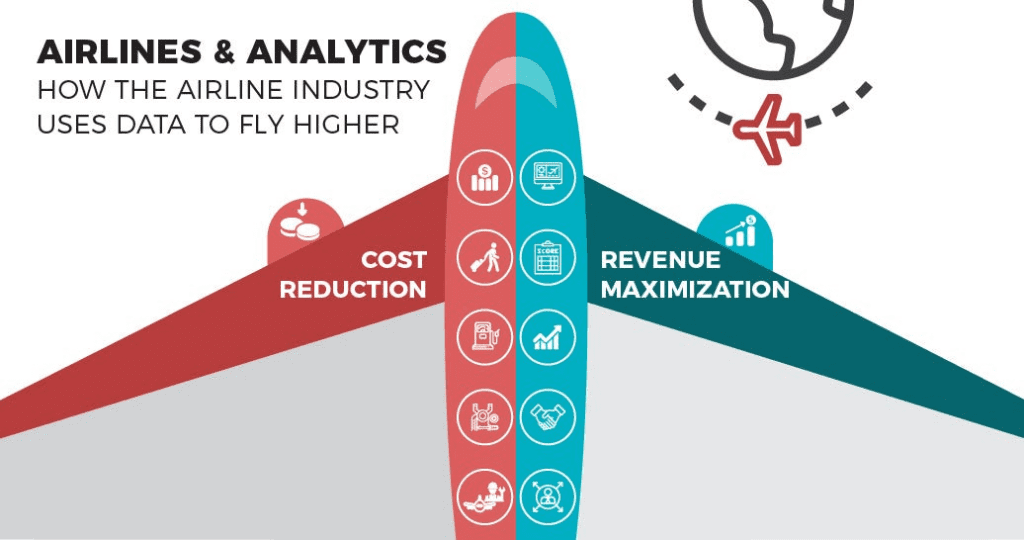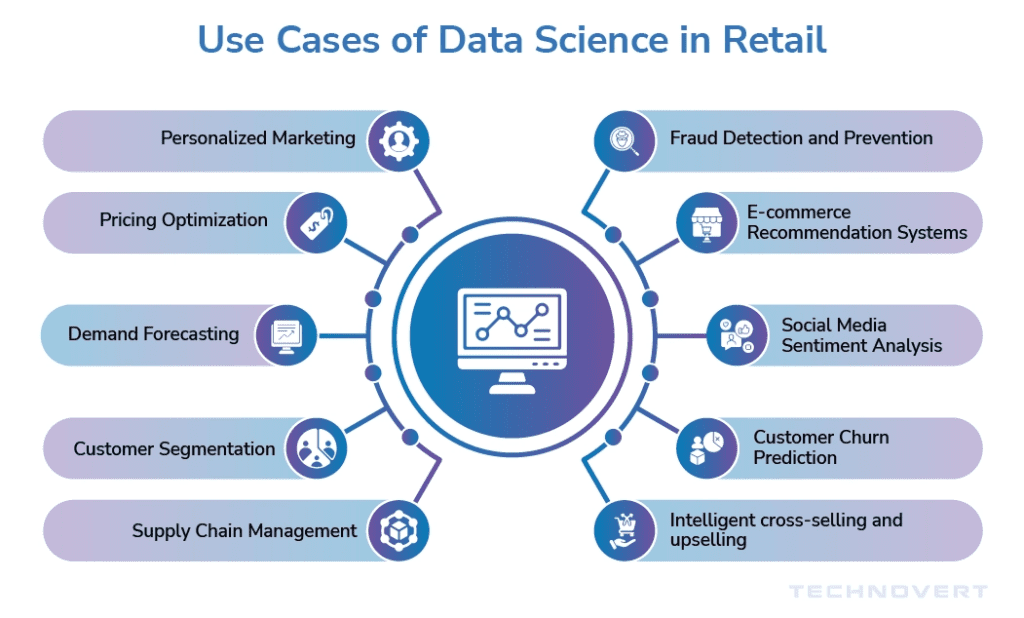
How do some industries seem to have cracked the code for success? It’s not luck—it’s the power of data science that changes the game. Whether it’s technology or the finance sector, data science is transforming how well we do things by understanding the data.
Research has shown that the employment rate for data scientists is projected to grow by a whopping 36% from 2021 to 2031 which proves the demand for data science for business growth. So, let’s learn about how data science is rewriting the rules across diverse industries. But, before we do that, first you need to understand the basics of data science.
Basics of Data Science
Data science is the art of deriving meaningful insights from complex data. It combines statistics, mathematics, and computer science to analyze and interpret vast datasets. By employing advanced algorithms and techniques, data science transforms raw information into actionable knowledge. This associative field plays an important role in predicting trends, identifying patterns, and facilitating informed decision-making across diverse industries.
Let’s learn about the impact of data science across various industries.

Impact of Data Science on Diverse Industries
Here we have researched and listed a few profound impacts of data science in top industries.
1. Hotel Industry
Data science is the secret sauce of success in the hotel industry. Without the help of data science improving guest experience which is the most important thing in the hotel industry is almost impossible. By providing personalized room preferences, and curated dining suggestions, all based on their past choices. That’s the magic of data science at play.
But, of course, it has some limits and challenges.
One of the biggest challenges comes with data privacy and quality in the hotel industry. And let’s not forget the hunt for skilled data science specialists – a bit like looking for a needle in a haystack.
Apart from that, the perks are worth pursuing to elevate your success in the hotel industry. Such as real-time adjustments in pricing which is one of the most essential for filling up the hotel rooms at profit. Today hotels are switching to a solution that might help them determine the real-time pricing to beat the competition. One such solution is using Hotel API to help hoteliers decrease hotel room prices while still managing profit.
That’s not all. Data science is also used in predicting when the coffee machine might call it quits, demand forecasting, customer feedback analysis, crafting successful marketing campaigns, and personalization.
In short, data science is a game-changer in the hotel industry for boosting reputation and revenue. Check out this Airbnb case study to see how data science propelled their valuation to $25.5 billion and their recommendations for rapid growth.
2. Aviation Industry

By utilizing the power of data science airlines are revolutionizing their operations across various domains. For revenue management, data science has become an indispensable technology that helps airlines understand customer willingness to pay and optimize pricing strategies.
Airlines depend on the Flight Data API to access crucial flight pricing information. This API provides valuable insights into market price trends that help airlines to determine the optimal prices aligned with what customers are willing to pay.
Not only this, but by using data science tools they can do demand analysis, predictive maintenance for mitigating costs linked to delays and cancellations, and feedback analysis to address customers’ pain points and enhance customer experiences
To know more in-depth about how data science can help airlines mitigate losses and improve efficiency, read this case study of Qantas Airlines.
3. Health Industry

Believe it or not, data science is behind innovative healthcare products. It is used in everything from patient care to research, and improving operational efficiency.
Massive datasets and data science applications are used in Medical Image Analysis, accelerates diagnosis through quick extraction of complex information from imaging techniques like MRI and CT scans.
In addition to that, Research and Development also benefit from rapid data processing that expedites the creation of medicines and vaccines. AstraZeneca R&D studies are a perfect example of how data science can help in creating innovative healthcare products.
Data science is used for improving patient reports with IoT devices generating health data which enable more effective treatments.
Plus, it also helps lower the cost by analyzing Electronic Health Records (EHRs) to identify health patterns that prevent unnecessary treatments. Data science is reshaping healthcare by offering boundless possibilities for innovation and improved patient outcomes.
4. Finance Industry
Data Science has emerged as a game-changer for streamlining processes and enhancing decision-making.
For many finance firms and businesses data science tools are indispensable for effective operations.
The multifaceted applications of data science in finance encompass algorithmic trading, fraud detection, risk analytics, real-time analytics, consumer analytics, customer data management, personalized services, and financial fraud detection.
Through analysis of structured and unstructured data, risk management becomes more informed, customer interactions are personalized, and real-time insights drive strategic decisions.
Notably, Algorithmic Trading harnesses massive datasets to devise rapid, complex trading strategies. And, if we talk about its impact on the banking sector Munish Mittal, SVP of IT at HDFC Bank, highlights the pivotal role of big data analytics in customer relationship differentiation.
5. Retail & E-commerce
Data science is a boon for the retail and e-commerce industry that helps them to survive in massive competition.
Through applications like recommendation engines, market basket analysis, and warranty analytics it helps in creating personalized customer experiences, increased sales, and customer loyalty.
Plus use of price optimization algorithms ensures competitive pricing, while inventory management tools help maintain efficient supply chains.
Even retail businesses can do location analysis for strategically placing new stores, and sentiment analysis on social media provides valuable insights for brand enhancement.
In addition to that, predictive data analysis provides lifetime value prediction to create successful marketing strategies that maximize the returns on customer acquisition investments.
Don’t forget to go through the case study done with the collaboration between Cambridge Spark and Carrefour on how data science and Python training help enhance customer experience and fuel business growth.

6. Manufacturing Industry
The Manufacturing industry is driving growth and success through data-driven decision-making. Plus, data science is also used in error reduction, supply chain management, and production system enhancement to contribute to increased revenue.
From predictive maintenance to automation and smart factories, data science is pivotal in transforming manufacturing processes.
In predictive maintenance, real-time data analysis optimizes maintenance needs without disrupting productivity.
Smart manufacturers use data-driven supply chain management for price and supply chain optimization, preparing for industry changes and ensuring profitability. Automation, aided by data science, enables significant productivity gains, exemplified by Siemens’ Digital Twin simulating production scenarios.
Data science validates material and design decisions in product development, while inventory management benefits from demand forecasting, promoting just-in-time manufacturing.
Computer vision applications enhance efficiency and quality control through AI-powered technologies. Moreover, data science also helps manufacturers in achieving enterprise-wide sustainability goals such as managing supply chain energy usage.
As manufacturing evolves, the demand for data science professionals continues to rise. Whether predicting demand or enhancing operational efficiency, a data science certificate primes individuals for rewarding careers in manufacturing data analytics.
Exciting opportunities await in smart factories that emphasize the crucial role of data science in shaping the future of manufacturing. To explore the benefits deeper check out this case study on data analytics for smart manufacturing which includes how data science propels operational efficiency and competitive advantages.

7. Energy and utilities
In the energy and utilities sector data science helps in fostering innovation and resilience.
Data science applications are used for optimizing operations, from failure probability modeling using machine learning for predictive maintenance to real-time outage detection and dynamic energy management.
It reduces costs and enhances reliability. Plus, the ability to take security measures, preventive equipment maintenance, and demand response management further illustrate its versatility.
Data-driven insights not only bolster efficiency but also elevate customer experiences through real-time billing and personalized services.
The integration of analytics in optimizing asset performance ensures reliability. This transformative influence of data science is driving the energy and utility sector toward a smarter, more efficient future.
Here are a few examples of the profound influence of data science in shaping energy and utilities which you should check out.

Conclusion:
The transformative power of Data Science reverberates across diverse industries.
Its applications, from personalized eCommerce strategies to predictive maintenance and smart energy management underscore the invaluable role it plays.
As industries evolve, embracing Data Science becomes imperative for sustainable growth and innovation.
So, get ready for the advancements and witness the metamorphosis, and seize the opportunities that lie at the intersection of data and progress.
